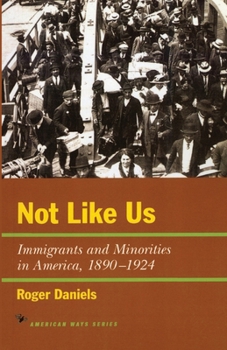Not Like Us: Immigrants and Minorities in America, 1890-1924
(Part of the American Ways Series Series)
Select Format
Select Condition 
Book Overview
Examining the conditions of immigrants, Native Americans, and African Americans between 1890 and 1924, the heyday of immigration and a time of supposed progress for American minorities, Mr. Daniels finds that these groups experienced as much repression as advance.
Format:Paperback
Language:English
ISBN:1566631661
ISBN13:9781566631662
Release Date:September 1998
Publisher:Ivan R. Dee Publisher
Length:192 Pages
Weight:0.75 lbs.
Dimensions:0.6" x 5.4" x 8.3"
Customer Reviews
1 rating
Right on the Mark!
Published by Thriftbooks.com User , 24 years ago
The compilers of this great book deserve cudos, including for exposing the British propaganda hoaxes of World War I and their baleful role in increasing hatred against German-Americans. The burning of Louvain, e.g., happened in the chaotic struggle against partisans, it was an overreaction, but not a planned atrocity, on the level of the British army burning parts of Dublin in 1916. Anyhow, I teach US history and immigration courses, and strongly endorse that book.






